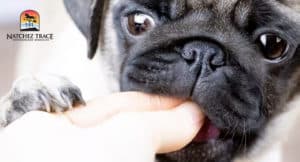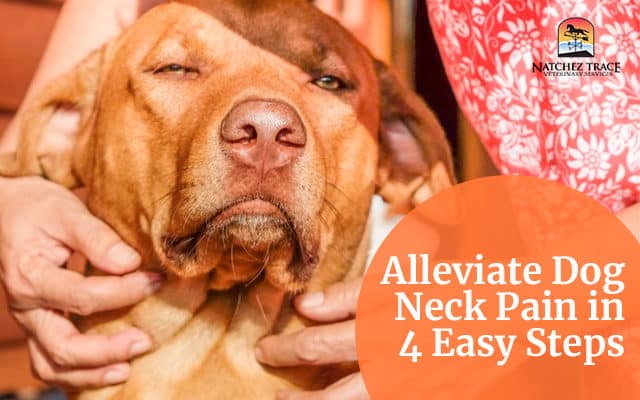Dog neck pain may seem mild and treatable on its own given a few days, but it can also signal a life-threatening emergency.
Neck pain in dogs is a common symptom of conditions such as inner ear infections, cervical injuries, soft tissue injuries, and especially spinal disorders.
Dog neck pains are not as simple as they seem, so you must learn how to spot the symptoms. This way, you can seek immediate medical attention and even perform first aid during emergencies.
Your canine best friend will thank you for it!
What are the Symptoms of Dog Neck Pain?
Here are some questions to help you identify your dog’s neck pain:
- Is your dog unable to or is having difficulty moving his neck in any direction?
- Does he yelp in pain from a simple touch on his neck?
- Does he suddenly have a reduced appetite?
If you can identify these symptoms of dog neck pain, bring your fur baby to the vet immediately so they can identify the cause. A vet’s opinion is necessary due to the wide range of problems that can cause your dog to experience anything from mild to severe neck and back discomfort.
How to Alleviate Dog Neck Pain at Home?
The type of therapy required will depend on the severity of the pain and what is causing it.
1. Physical Therapy

Physical therapy is an excellent alleviation for dog neck pain. Remember to contact and ask for advice from a trained animal physical therapist on the best activities for your dog’s condition. Follow the assigned physical exercises thoroughly for your pet’s spinal or cervical condition’s improvement and recovery.
2. Administer medication specifically for dogs
 You can alleviate dog neck pain immediately with pain relief medication in case your dog is suffering from severe pain and you are unable to take them to a vet. Additionally, your vet may recommend muscle relaxants and anti-inflammatory drugs to alleviate the discomfort and promote mobility if your dog has a sprained neck. Allocate lots of time for your dog to rest and recover.
You can alleviate dog neck pain immediately with pain relief medication in case your dog is suffering from severe pain and you are unable to take them to a vet. Additionally, your vet may recommend muscle relaxants and anti-inflammatory drugs to alleviate the discomfort and promote mobility if your dog has a sprained neck. Allocate lots of time for your dog to rest and recover.
3. Provide Supportive Care
 The best approach to treat cervical disc illness is with supportive care unless your veterinarian advises surgery to repair a slipping disc. Keep your strolls brief. On walks, use a harness rather than securing the leash to your dog’s collar. A collar might cause additional neck stress in your dog. Give your dog any painkillers or muscle relaxants that your veterinarian has prescribed.
The best approach to treat cervical disc illness is with supportive care unless your veterinarian advises surgery to repair a slipping disc. Keep your strolls brief. On walks, use a harness rather than securing the leash to your dog’s collar. A collar might cause additional neck stress in your dog. Give your dog any painkillers or muscle relaxants that your veterinarian has prescribed.
4. Administer Natural Herbs
 Natural herbs are non-invasive treatments for dog neck pain.
Natural herbs are non-invasive treatments for dog neck pain.
Consider trying the Herbsmith Rx Pueraria Support Spine formula which is an herbal solution useful in the management of cervical dysfunction and other spinal disorders caused by blood stasis or wind. The spine is the trunk that carries the neck, so to speak; hence, a well-supported neck requires a healthy spine.
Herbsmith Rx Pueraria Support Spine
Herbsmith Rx Pueraria Support Spine is made with various herbs carefully selected to support the spine. Supporting the spine greatly aids in relieving dog neck pain, spinal disorders, and cervical injuries.
Established and rooted in Eastern Medicine, the active elements of Pueraria, Clematis Root, and Notopterygium Root are aimed at supporting the dog’s tai yang channel which is the most susceptible to wind invasion and wind obstruction. This is where neck or spine injuries often occur.
The rest of the herbs (White Peony Root, Millettia, Cinnamononi Cassiae, Angelicae Sinensis, Ligustucum, Chinese Quince Fruit, and Licorice) are required to alleviate your dog’s blood stagnation and stasis which may be causing the neck pain.
While many of these natural therapies might help your dog feel better, some might not be the best choice for him. If you think your dog could be in discomfort, you should always visit your veterinarian. They can provide potential treatments and assist in identifying the root problem.
Prevention Is Better Than Cure
Preventing neck pains and spine disorders is always better than needing to alleviate or treat them.
Your dog can avoid neck and back pain by being physically active and slim. Dogs’ backs may experience additional strain if they carry more weight than usual.
Aside from strengthening your dog through physical activities, you can also give them a neck massage now and then.
Now that you know how to identify dog neck pains and alleviate them, go ahead and inspect your fur babies.
Make sure that they’re healthy and fit!
Contact us if you’d like to get Dr. Smith’s opinion on your dog’s neck pain.








